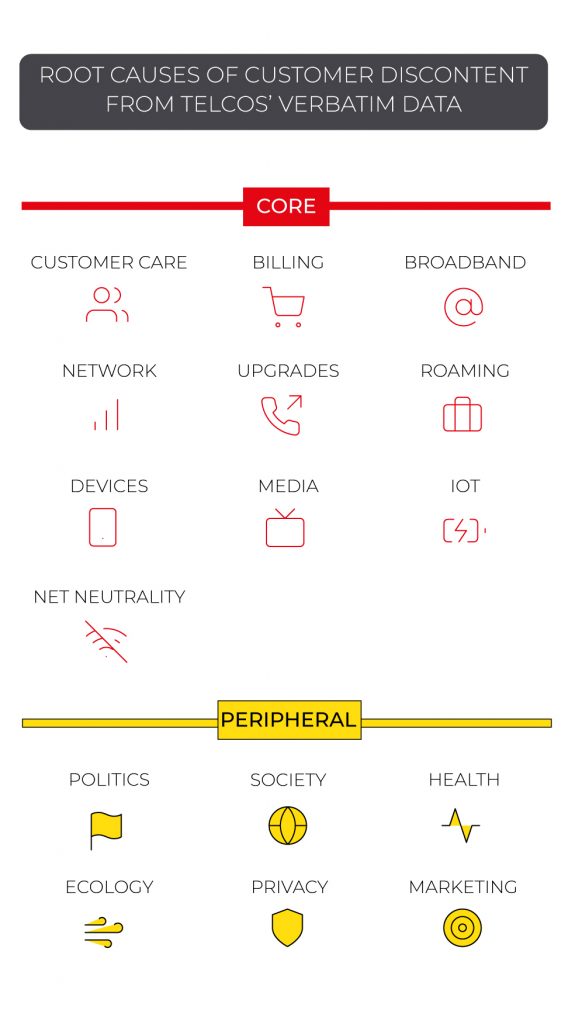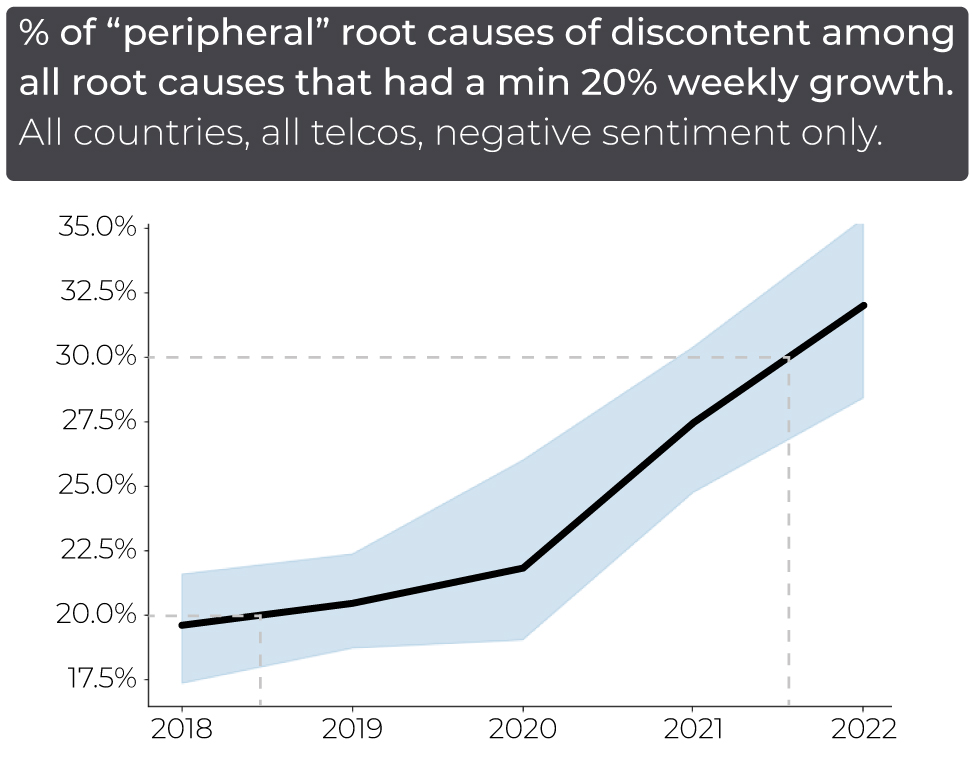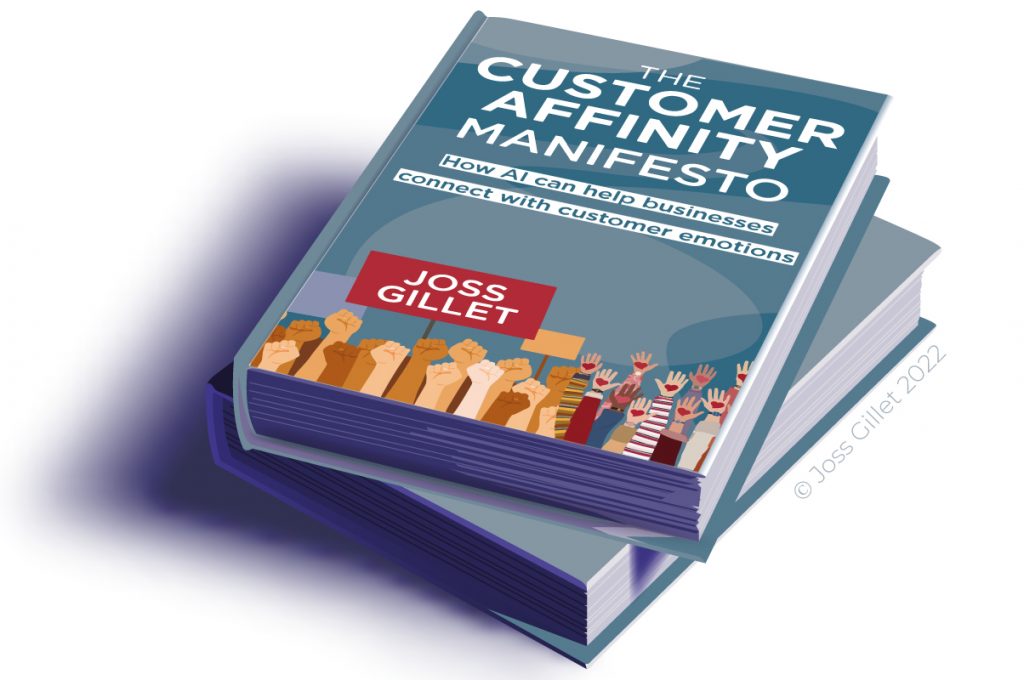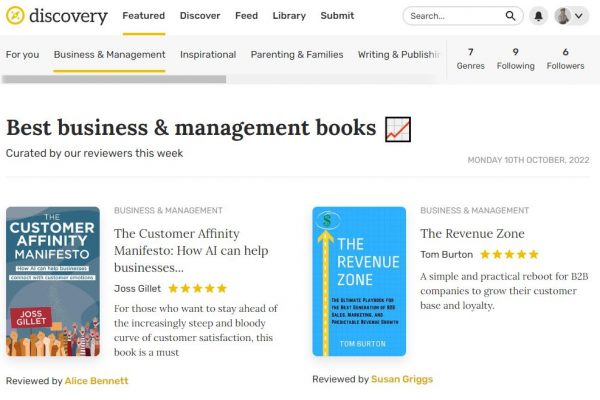Press Release --- Embargoed Until October 3rd, 2022.
A decade after the launch of the first 4G LTE network in the UK in October 2012^1, high-speed mobile internet largely reshaped consumption behaviour. However, since the pandemic, customers have not gotten more forgiving. Between 2018 and 2022, the Telcolingo Project studied three million comments that customers addressed to their telco providers on social media^2. During this period, the AI-powered research monitored weekly some 16 root causes of customer discontent in the UK, the United States, Canada, Australia, South Africa and New Zealand.
This study is of the essence since it allows industry leaders to explore:
- How customer behaviour and expectations evolved over the past years;
- How AI can help to connect with customer emotions to build long-lasting relationships.

In the UK, as in other countries studied, seven in every ten customers posting enquiries on telcos’ Twitter channels expressed negative emotions. On a scale ranging from 0 (negative) to 1 (positive), telcos’ customer sentiment index averages 0.33^3. What came as a surprise is that complaints span way beyond the expected network coverage or billing issues. Indeed, the study offers unique insights into what makes customer tick and what would make them shift their spending to the competition. The root causes of customer discontent are spread into two categories:
- “Core” root causes that relate to product performance or quality together with the notion of value-for-money at heart;
- “Peripheral” root causes which refer to companies’ efforts to be righteous, ethical, socially responsible, ecological, non-invasive and protective of their privacy.
Peripheral concerns are not driven by greater tech-savviness, but by greater ethical awareness. Customers expect companies to not put profit over people and to associate their brands with a “Greater Good Purpose” (GGP). Peripheral complaints are exacerbated by events that shook up the lives of many over the past five years, such as the Covid-19 pandemic, Brexit in the UK, presidential elections in the US, together with human and customer rights events, and much more. Modern businesses face a new reality with customers expecting them to be examplary, to give back to society to the point the brand would be missed if it were to go bust.

Over the past five years, the Telcolingo Project showed that the reccurence of “peripheral” root causes of customer discontent increased by 10 percentage points between 2018 and 2022. In the near future, new political and societal events will continue to influence customer expectations. As telcos’ audience becomes even more polarised and “partisan consumerism” becomes the norm, the trend is forecast to continue with peripheral concerns crossing the 40% mark by 2025^4. In the “health” topic alone, customers expect telcos to address pressing concerns about the global pandemic, mental health and 5G. These represent around half of all health-related issues raised by customers in the past five-year period. Building long-lasting relationships with customers will therefore require telcos to be able to spot concerns and pivot fast — a mission that goes beyond the sole remit of their call centres or their Corporate Social Responsibility (CSR) teams.
Joss Gillet, Telcolingo Project Founder
AI for customer affinity is a no-brainer. The Telcolingo method was powered by Deep Learning and Natural Language Processing techniques and allowed to automatically make sense of thousands of comments written by customers weekly. Evidence shows that one unpleasant experience with a provider is reason enough for customers to jump ship and turn their anger into a 280 characters boycott call. This method is a goldmine for marketers and is a much more cost-effective and frequent than traditional surveying methods. It is in the interest of any company deploying an omnichannel strategy since it can protect customer affinity. In a saturated marketplace, affinity prevails^5 and finding innovative tools that help to connect with customer emotions and nurture excellent customer relationships is essential to survive the next decade.
Notes:
^2: Visit www.telcolingo.com to access the data analytics platform.
^3: Average across the US, Canada, the UK between May 2018 and May 2022. After cleaning of non-sensical tweets.
^4: Average across the US, Canada, the UK.
^5: Refer to: Customer Affinity vs. Loyalty: guess which one is a myth ?
##Ends##
About:

The Telcolingo Project was founded by Joss Gillet who spent 15 years as an ICT industry analyst working for Motorola, Ovum, the GSMA and the ITU. The research spanned three million comments that customers addressed to telcos between 2018 and 2022 in selected markets. Gillet packaged the conclusions of the study in his first book entitled The Customer Affinity Manifesto: How AI can help businesses connect with customer emotions. Gillet is CTO of Hiphen, a fast-growing Agtech company delivering AI-powered image analytics solutions to help the agriculture sector adapt to climate change.


